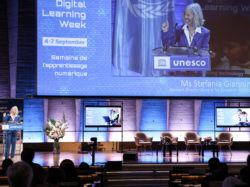Digital Learning Week is UNESCO’s new annual flagship event on digital learning and the transformation of education. The four-day event was held in Paris on 4-7 September and offered a diverse range of exciting events, including plenary sessions featuring esteemed experts and Ministers of Education.
The Grand Opening
The inaugural Digital Learning Week was opened by Ms Stefania Giannini, Assistant Director-General for Education, UNESCO.
The event builds on the foundation Mobile Learning Week and its experience over the past decade, bringing together the community of leaders, policy-makers, researchers and practitioners from various organizations, including UN agencies, governments, NGOs and the private sector.
Under the motto of “Steering technology for education”, Digital Learning Week delved into the transformative influence of digital learning platforms and advancements in AI as part of building a new social contract for education, examining how both can be steered to reinforce and enrich humanistic education. The event gathered international decision-makers, educators, private sector partners, and development agencies to jointly respond to the new dynamics around digital innovation, and steer technology for education.
UNESCO IITE: Harnessing digital technologies
Digital Learning Week presented a rare opportunity to participate in dynamic and thought-provoking discussions, dialogue and groundbreaking ideas, and to foster meaningful co-creation that promotes collaborative efforts to advance the digital transformation of education.
Moreover, dynamic breakout sessions provided attendees with the opportunity to engage with speakers selected through a competitive call for proposals.
UNESCO IITE organized a breakout session “Harnessing digital technologies to promote open education and green skills”. The session was arranged and conducted by the UNESCO IITE and its co-organizing partners, namely the Commonwealth of Learning (COL) and the UNESCO Chair in Greening Transition for Carbon Neutrality and Climate Change (China).
The core objective of the UNESCO IITE breakout session was to reveal and discuss promising best practices and encouraging success stories from across regions on the importance and benefits of building viable green skills. The focus was on TVET and higher education and the tailored use of ICT and technology-responsive pedagogy.
The session was moderated by Ms Natalia Amelina, Senior National Project Officer in Education, Chief of TPDN Unit. During the session. The speakers discussed the following topics during the panel:
Quality of education at open and distance learning universities, Ms Svetlana Knyazeva, Senior National Project Officer in Education, Chief of DPLM Unit
Skilling at scale for the green economy, Mr Robert Okinda, Skills Advisor, Commonwealth of Learning
Greening TVET empowered with advanced ICT and AI, Ms Oksana Novikova, Vice-Chairholder of UNESCO Chair on Distance Education in Engineering,
Greening Education Empowering Energy University for a Sustainable Future, Mr Ray Rui, Head of the UNESCO Chair on Green Transition for Carbon Neutrality and Climate Change
Enhancing TVET through digital transformation in developing countries, Ms Katerina Ananiadou, Programme Specialist, Section of Youth, Literacy and Skills Development, UNESCO
The Outcomes
The UNESCO IITE breakout session focused on the critical importance of increasing teachers’ understanding of climate and sustainability issues and helping them develop necessary skills through adequate pedagogical, methodological, and ICT-related support.
The participants of the session gained ground for discussion of the existing difficulties and emerging challenges that teachers may face when educating students about the causes and effects of climate change and viable responses.
The Workshop also provided the floor to discuss the issues of reconsidering or adjusting existing approaches to education, especially the potential of ICT and digital pedagogy, to provide learners with the essential knowledge and skills to respond to the rapidly changing world and the demands of the transforming labour markets.
DLW 2024: more inclusion and accessibility for all

The first edition of Digital Learning Week was an occasion to showcase the major achievements of harnessing digital technologies for greater inclusion in education.
The next edition of Digital Learning Week is scheduled for March 2024. This annual event will be a key milestone in steering technology for education, in order to make education even more inclusive, humanistic and accessible for all.

















